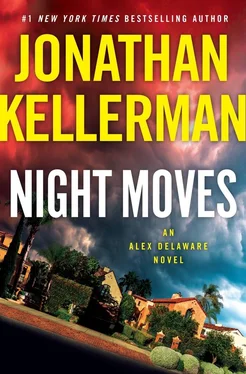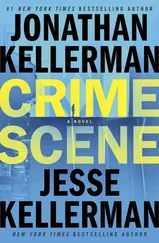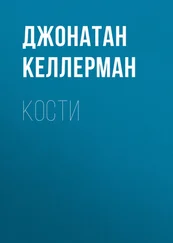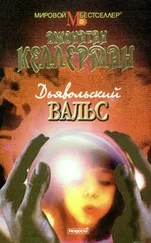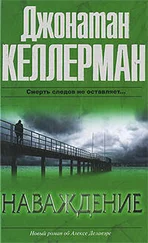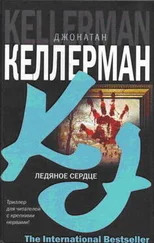Another brag? Practical, too, because it allowed the confederate plenty of time to drag and position the corpse, tidy up, and leave.
Then, for good measure, divert attention to the asocial weirdo living next door.
Something about these people.
After three-hundred-plus homicides, Milo’s instincts were well honed.
I called his office phone.
He said, “Nothing so far on any New York Bitts.”
“You going to be there for a while?”
“Just had a snack, doing some paperwork.”
“I’m coming over.”
“Chelsea told you something juicy?”
“Never got to talk to her,” I said.
“So what’s up?”
“Don’t want to drive distracted, see you in twenty.”
Milo’s closet-sized office sits midway along a coldly lit corridor on the second floor of West L.A. Division. The remainder of the hallway is given over to storage and a couple of interview rooms reeking of anxiety. My friend’s meager allotment looks like nothing but punishment, but it’s not that simple.
He operates in isolation from every other detective in the building, an arrangement foisted upon him years ago as part of a deal with a corrupt, retiring police chief. The chief had viewed the windowless cell as a final dig at the gay cop who’d forced his hand. Little did he know that Milo welcomed the setup.
Years later, he still dens like a grizzly in a cave, gladly avoiding the din and scrutiny of the big detective room.
His actual job — a lieutenant who gets away from his desk and works — is another oddity. Two subsequent police chiefs bristled at the break in procedure and decided to correct it. Both changed their minds when they learned about his solve rate.
I arrived just after five, got a nod from the civilian clerk in the reception area, bounded up the stairs, and headed for the lone open door. Milo was waiting for me, filling a swivel chair that faced the metal straight-back he’d set up for me. Three feet between our noses. A large greasy pizza box leaned against a wall. The air was warm, close, saturated with garlic. The box was empty. Snack time.
He breathed into his palm, took a stick of chewing gum out of his desk and began chomping. “It bothers you, we can go outside.”
I said, “No prob. Got a bunch of theory for you. Can’t promise you’ll like that smell.”
He listened, rubbed his eyes, studied the low, perforated ceiling.
“All that,” he said, “from a screwed-up appointment.”
“More than screwed up,” I said. “The more I think about it, the more convinced I am Chet was out to humiliate Felice.”
I went on to list the psychopathic symptoms. “Maybe I am overreaching, but I thought you should know.”
He rotated his neck. “You really think he’d be that arrogant? His own damn house.”
“If his home life is something he despises, why not? Right from the beginning you felt something was off about the family.”
“That was in terms of them being targets, not participants. Which you went along with.”
I said nothing.
He said, “Okay, I’ll be open to new possibilities. Does that mean you consider Bitt lower-priority?”
“Not necessarily,” I said. “I just think Corvin should be looked into.”
“Multitasking, yippee,” he said. “Looked into how?”
“Cellphone records, his travel schedule.”
“That means subpoenas. You know the problem.”
“No grounds.”
“Not even close.” He picked up a pencil, twiddled, laid it back down.
I said, “There’s another potential avenue. His wife hates him.”
“Hostile spouses and exes, the policeman’s boon. You see Felice as approachable?”
“Not yet.”
“What, then?”
“Keep Chet in mind and concentrate on I.D.’ing John Doe.”
He stood, managed a vertical stretch, hands nearly touching the ceiling. “Not much of a plan.”
He walked out of the office.
I said, “Where to?”
“When in doubt, nourish thyself, time for dinner — eh, eh, don’t wanna know if you’re hungry. Just tag along and pretend.”
A week after the handless man’s murder, Milo got the department to issue a press release. Middle-aged male found in a “Westside location,” missing his spleen and a kidney, “other” evidence of an old injury.
Coverage was rejected by the network TV affiliates, granted twenty seconds on the eleven p.m. news broadcasts of two local stations. The Times offered a squib in the online homicide file. Once the story was picked up by a few other sites, the phone began ringing, tips coming from the usual mix of well-intended citizens, pranksters, and a squawking menagerie of conspiracy theorists and other dimwits.
Information in the cyber-age might as well be written with invisible ink. Within twenty-four hours, the tip line had gone dead. Then, on a Tuesday, a single after-spurt caused Milo to phone me.
“Maybe I made Santa’s good-boy list, a woman who actually sounds sane described the physical stats and the broken bones down to a T. Her ex-husband, Hal Braun, fifty-four. The accident was a fall during a hike eleven years ago. I’m heading out to see her. You free?”
“You need to ask?”
“I should take you for granted?”
Mary Ellen Braun, fifty-one, lived in Encino and sold handbags at Saks in Beverly Hills. By the time Milo picked me up, he’d done the usual background. Her sole infraction was three years ago, a failure-to-stop traffic citation at the intersection of Gregory and Roxbury.
I said, “A few blocks from Saks, maybe rushing to the job.”
“Good work ethic,” he said. “I’ll take that as a positive.” As we walked to his unmarked: “God, I hope she’s not a loon.”
B.H. was south but he turned toward the Valley.
I said, “She’s not working?”
“Home, taking a sick day. I’m guessing she doesn’t want to be seen with the cops. There was stress in her voice. I’ll take that as a positive.”
We pulled up to a white, three-story condo building labeled La Plaza that spread across four lots on a quiet street west of Balboa and north of Ventura Boulevard. Security cameras, warning signs, and a gated sub-lot offered emotional support. The directory said that Braun, M. E. lived in unit twenty-four. A button-push was followed by a whispery “Hold on,” a click, and a buzz.
We rode the elevator up two flights, stepped into a red-carpeted hallway, made our way to the sixteenth of at least twice as many black doors.
The woman who answered Milo’s gentle-version knock was of medium height with a medium build and medium-brown eyes. Medium-brown hair was cut in an unfussy bob. Stress in her voice but a face rounded by middle age looked composed.
“Lieutenant? Mary Ellen.”
“Thanks for seeing us, ma’am. This is Alex Delaware.”
Mary Ellen Braun’s smile at me lasted as long as the eyeblink that accompanied it. She offered cold fingertips. “Please come in, guys.”
Her unit was compact, well kept, with coral-colored couches and a bronze-and-glass coffee table holding muffins and coffee. An open plan allowed a full kitchen view of white cabinets and stainless-steel appliances. Apothecary jars filled with lemons sat on black granite, along with smaller vials of what looked like herb-infused oil.
The three of us sat and Mary Ellen Braun pointed to the muffins. “Please help yourselves.”
“Thanks,” said Milo.
“Let me pour for you. You, too?”
I’d had my fill of caffeine but said, “Please.”
As I sipped minimally, Milo got to work on a chocolate muffin. “Thanks for calling us, Ms. Braun.”
Читать дальше
